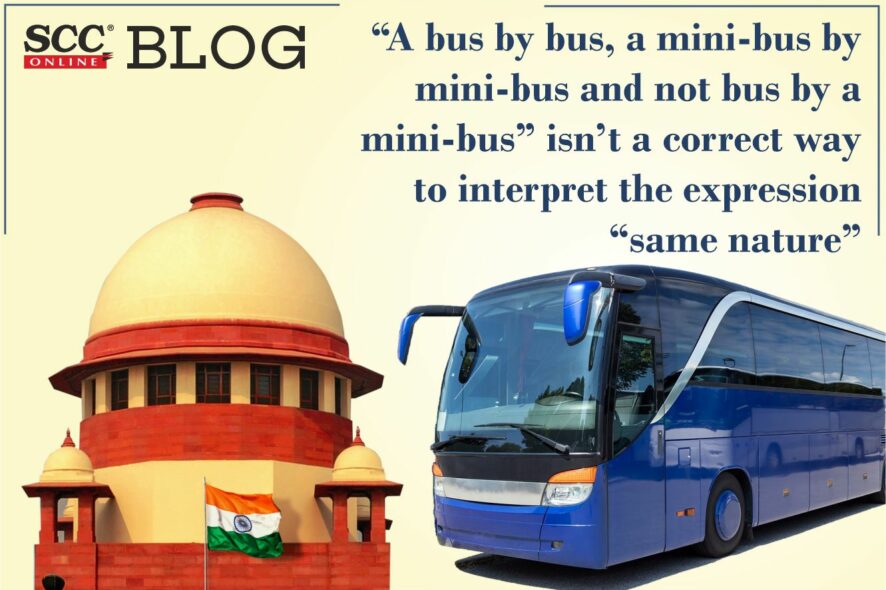Supreme Court: The Division Bench comprising of K.M. Joseph and Pamidighantam Sri Narasimha*, JJ., held that Rule 174(2)(c) of the Kerala Motor Vehicle Rules,1989 is valid and salutary and does not go beyond the scope of Section 83 of the MV Act, 1988. While interpreting the expression “same nature” the Bench observed that such expressions are better kept open ended to enable courts to subserve the needs of changing circumstances. The Bench expressed,
“…the assumption in the impugned judgment that the expression “same nature” is confined only to, mean “a bus by bus, a mini-bus by mini-bus and not bus by a minibus….” is not a correct way to read the provision. There is no need to restrict the meaning of an expression same nature.”
The question posed before the Bench was; can a State Government make Rules, enabling the road transport authority to reject an application for replacement if the proposed vehicle is older than the one covered under the existing permit?
By the impugned order, holding that the Rule 174(2)(c) of the Kerala Motor Vehicles Rules, 1989 traveled beyond and contrary to Section 83 of the Motor Vehicles Act, 1988, the Kerala High Court had opined that When the expression is vehicle of same nature, then if Rule l74(2)(c) restricts that an older vehicle cannot be brought in, it would be restricting the right conferred to a person by the provisions of the Act. Surely such an exercise by a delegate cannot be permitted. Rules have to be consistent with the Act and not restricting or in derogation thereto.
Noticeably, Rule 174(2)(c) of the Kerala Motor Vehicles Rules, 1989 provides that “upon receipt of the application, the Transport Authority may in his discretion, reject the application – (c) if the new vehicle proposed is older than the one sought to be replaced.” While Section 83 of the Act provides for replacement of vehicles by the following terms: “The holder of a permit may, with the permission of the authority by which the permit was granted, replace any vehicle covered by the permit by any other vehicle of the same nature.”
To interpret the expression, ‘of the same nature’, the Bench gauged through the whole statutory scheme under Chapter IV and Chapter V where the former provides for the powers of the Central Government with respect to fixation of the age of the vehicle, or fitness of the vehicle while later provides for the powers of the State Government to deal with transport vehicles except under Section 88 of the Act where the powers are subject to the rules made by the Central Government. The Bench opined that the placement of Section 83 in Chapter V is recognition of the need to provide a seamless mechanism for replacement of a vehicle during subsistence of a transport permit.
Considering the term “vehicle of the same nature” in the context of Chapter V relating to transport vehicles, the Bench explained,
“…it becomes clear that the provision is intended only to enable the owner to work his permit without any interruption even if there is a need to replace the vehicle covered by the permit. There is no other purpose. It is intended to be a simple transaction and this is reason why the scope of scrutiny is limited only to examining if the vehicle is of same nature as in the permit.”
Hence, the Bench opined that the context, in which scrutiny of the Regional Transport Authority is called upon, is only to ensure that the conditions of the permit are not deviated from. Therefore, the scrutiny is not of the vehicle in itself but the vehicle in relation to the permit and a scrutiny of the vehicle, irrespective of its relation with the permit becomes an irrelevant consideration for the purpose of Section 83. Particularly, when questions relating to the vehicle or about the vehicle are matters of concern in Chapter IV, under which the Central Government is empowered to set the norms for the fitness or the age limit of the vehicle and Chapter V, on the other hand contains the legal regime with respect to operations of transport vehicles. Chapters IV and V operate in their own field subserving the purpose and objects mentioned therein.
In the light of the above, the Bench held that Rule 174 (2) (c) made by the State Government to enable replacement of the vehicle under a Transport permit, did not impinge upon the powers of the Central Government with respect to fixation of the age of the vehicle, or fitness of the vehicle conferred upon it under Sections 56 and 59 in Chapter IV. The Bench observed,
“The scrutiny under Rule 174 is only to enable the Authority to ensure that the subsisting permit is not interrupted and at the same time public interest is not compromised by deviating from the permit. The Rule will have no bearing on the power of the Central Government and as such it would not be ultra vires the provisions of the Act.”
Consequently, the Bench concluded that Rule 174(2)(c) was not ultra vires the provisions of the statute and the reasoning adopted by the Division Bench that Rule 174 (2) (c) has overridden the Act was not correct because a subordinate legislation must be interpreted to effectuate the statutory purpose and objective and the High Court failed to appreciate the context in which Rule 174 (2) (c) read with Section 83 was to be construed. Hence, the impugned judgment was set aside.
[Regional Transport Authority v. Shaju, 2022 SCC OnLine SC 209, decided on 17-02-2022]
*Judgment by: Justice Pamidighantam Sri Narasimha
Appearance by:
For the State: G. Prakash, Advocate
Amicus Curiae: Santosh Krishnan
Kamini Sharma, Editorial Assistant has put this report together







